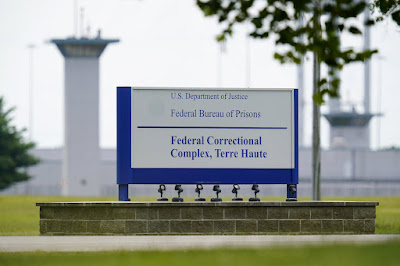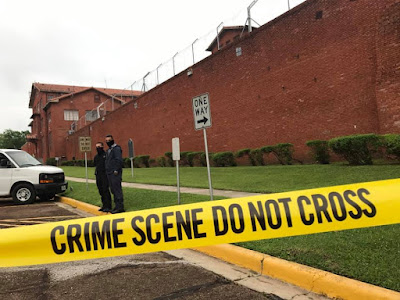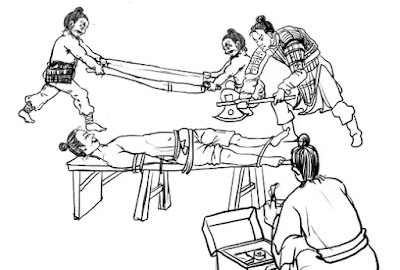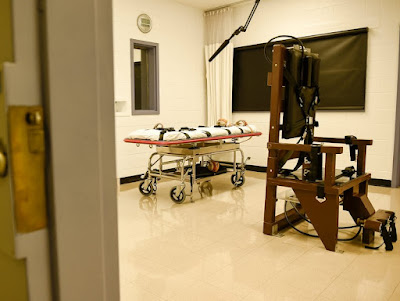Neither of the 2 men scheduled to die on Alabama's death row early this year will be able to speak to the media face-to-face before they're put to death, a prison official said.
The Alabama Department of Corrections this week turned down The Anniston Star's request for an in-person interview with Thomas Arthur, who is scheduled for execution Feb. 19. Arthur had requested an interview in letters to the newspaper.
In a brief email to The Star, Alabama Department of Corrections spokeswoman Latonya Burton said there will be "no interviews of (the) condemned or those on death row" based on a state law that limits access to condemned inmates. Under the law, only physicians, lawyers, relatives, friends and spiritual advisers may visit inmates on death row.
Attempts to reach Burton for further comment on the policy were unsuccessful this week.
Death row interviews are somewhat rare, because lawyers typically don't want their clients to give interviews, said Richard Dieter, director of the Death Penalty Information Center, a nonprofit that studies capital punishment.
"What usually happens is that the media wants the interview but the inmate or the inmate's lawyers don't want one," he said. He said it was "unusual" for a state to have a blanket policy denying interviews to inmates who request one.
"A person about to be executed certainly has something the public might want to hear and the media is the way the public would hear it," he said.
Florida allows death row inmates to schedule interviews with individual reporters, and gives condemned prisoners a chance to speak with up to 30 reporters in a press conference on the day before they're executed.
Tennessee prohibits media interviews with death row inmates, according to state regulations. Attempts to reach prison officials in Mississippi and Georgia for comment on their policies were not successful Friday.
Janette Grantham, of the victims' rights group Victims of Crime and Leniency, said death row interviews only cause pain and suffering for the friends and family members of murder victims.
"There is nothing he can say that will help the victims," Grantham wrote in an e-mail.
Grantham said a woman she knew, the mother of a murder victim, "was so shocked that she had a stroke" when she saw a former death row inmate hugging his girlfriend on a nationwide news program. Grantham didn't name the inmate, but said it was someone whose sentence was commuted when the Supreme Court ruled states can't kill inmates who were under 18 at the time of their crime.
"Those out there for a story should stop and think of what it does to the victims' families," she wrote.
Alabama's law on death row inmate access has been in place since 1985, but the current ban on inmate interviews seems to date to 2002, when state courts ruled that the law did allow the Department of Corrections to block such interviews.
In that case, television station WSFA sued for the opportunity to interview Lynda Lyon Block, who would become the first woman in Alabama executed since 1957 and the last Alabamian killed in the electric chair.
WSFA reporter Eileen Jones argued at the time that denial of an interview violated her First Amendment rights as a journalist. Prison officials argued that the interview ban was in place for security reasons. In its ruling, the court noted that reporters can still conduct interviews by telephone and mail.
British writer Tahir Shah managed to interview Block in person, though it's not clear whether that interview came before or after the court ruling. Prior to that, the most recent interview of an Alabama death row inmate by a news organization was an Associated Press interview with Henry Francis Hays before his execution in 1997.
Hays, a Klansman, was convicted in the 1981 lynching of black Mobile resident Michael Donald.
Alabama hasn't conducted an execution since 2013, largely because of drug shortages and legal challenges to the state's protocol for conducting lethal injection. Arthur, a 73-year-old convicted in the 1980s murder-for-hire of Muscle Shoals resident Troy Wicker, was scheduled to be executed in 2008 and 2012, but obtained stays of execution after filing court challenges.
One of Arthur's challenges to the case involves a wig found in Wicker's car after the murder. Past DNA testing on the wig proved inconclusive, and Arthur's lawyers have offered to pay for a new round of testing using technology that wasn't available during the most recent test.
Another convict, Bobby Ray Gilbert, stated in an affidavit in 2008 that he killed Wicker. Gilbert later refused to testify about the case in court, citing his rights under the Fifth Amendment.
Last fall, the state sought execution dates for 9 men on death row. So far, only 2 dates have been set: 1 for Arthur and 1 for William Kuenzel, convicted in the murder of a convenience store clerk in Sylacauga.
Kuenzel is set for execution March 19.
Source: Anniston Star, January 3, 2015




.jpg)





